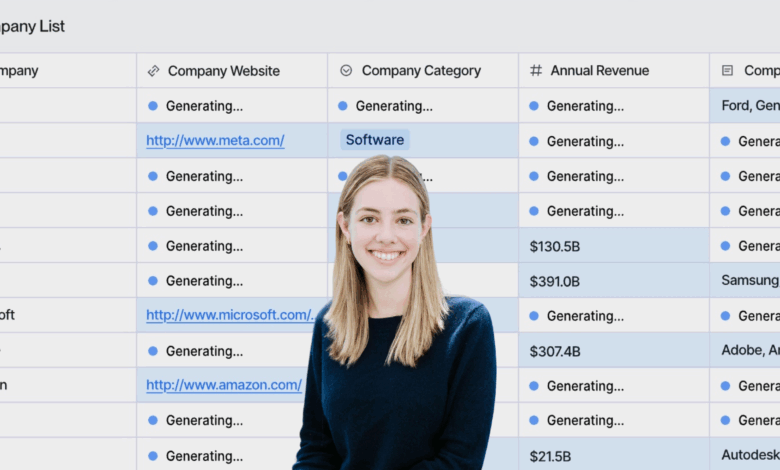
Spreadsheets still run a lot of the working world. They hold customer lists, research, growth models, and the first drafts of strategy. But they weren’t built for the pace and data volume of today. Paradigm, a San Francisco startup led by founder and CEO Anna Monaco, thinks the the fix is to give every cell of a spreadsheet its own AI agent.
Today the company is making its product generally available and announcing its raised $7 million in funding to-date, including $5M in seed funding from General Catalyst, along with a $2M pre-seed from Y Combinator and a roster of founders from Ramp, Dropbox, LangChain, Zapier, Intercom, and others. Anyone can try the product at paradigmai.com.
The pitch: a spreadsheet that does the work for you
Paradigm calls itself an “agentic spreadsheet.” In plain terms, it embeds AI agents directly into the grid so teams can research, analyze, and produce deliverables without jumping between tools. The company says thousands of users at firms like Cognition, Crossbeam, and Etched used the beta and are now generating hundreds of thousands of cells each week.
The idea addresses a common pain. Knowledge workers spend hours gathering information, cleaning it, and turning it into something presentable. Add in copy-pasting between AI tools and the spreadsheet, and projects slow, quality dips, and errors creep in. Paradigm keeps the flow in one place and lets agents handle the heavy lifting.
“Our mission is to build an interface that allows individuals to distribute their ability to reason, one that makes agent orchestration widely and pervasively accessible.” Monaco says in the company’s press release. “Over the past year we have turned Paradigm into a full-fledged workspace with live collaboration, shared folders and sheets, workflow support, and even the ability to send emails and create documents. Entire companies are being run on Paradigm at this point.”
Now available for everyone
Since the beta in late 2024, the company has added live collaboration, richer document writing inside the sheet, and a more capable chat agent. Paradigm says it uses top-tier models (including, most recently, GPT-5) and positions the spreadsheet not as a finance tool, but as a universal interface for automated web research and analysis at scale.
Enterprise users will care about speed and auditability. Paradigm claims its agent swarms can fill up to 5,000 cells per minute, orders of magnitude faster than manual work, and leave a traceable path to sources. Crossbeam’s head of AI operations, Matt Nicosia, is blunt in his assessment: “Paradigm does research at such a scale and depth that would not even be feasible with humans. It was more accurate than any other solution we’ve tested and incredibly easy to get up and running.”
Paradigm making gains in a hot market
Paradigm enters a crowded space. Spreadsheets are seeing rapid AI upgrades, and there’s no shortage of tools that promise to research the web, enrich lists, or draft deliverables. The company’s wedge is specificity: keep the familiar grid, make it collaborative, let agents do the research at scale, and push the output straight into documents or emails from the same place.
The company is betting that the spreadsheet remains the default canvas for planning and analysis, so putting agent orchestration inside the sheet is the shortest path to value. You ask for a market map, customer segmentation, or outbound prospecting list; agents fan out across the web, pull and verify data, format results to your standard, and draft a brief, without leaving the workbook.
It also reframes how teams use AI. Instead of writing prompts in a separate chat, users design the work as a table and let agents fill it in, row by row. That makes results easier to review and share, and it fits how teams already track work.
Paradigm is now open to the public with pricing that starts at $20 per month. Power users can upgrade to faster and more capable models or enable usage-based billing for larger jobs. All users can run agent swarms; the company positions tasks that once took hours or days, like market mapping or lead research, as “seconds-level” workflows.
Fast growing team of top AI talent
Paradigm was founded by Anna Monaco, June Lee, and Michael Alfano. They share a clear goal: make the spreadsheet a place where AI agents do real work. The team keeps the interface familiar so people can research, analyze, and ship deliverables without switching tools.
Paradigm also announced the addition of Flora Guo as its founding design engineer. Prior to joining, she ran an independent studio for AI, fintech, and deep tech startups (aragon.ai, valour.com, retro.bio), contributing to raises including $200M for Retro Bio. Most recently, she was a design engineer at Vercel working on v0.dev.
“I joined Paradigm because this team can build something truly transformative. Spreadsheets endure because they mirror how we process data at scale, making them an ideal foundation for an AI interface,” says Guo.
Backing from top investors and founders
“Paradigm is one of the clearest examples of what an AI-native product should look like,” says Niko Bonatsos, managing director at General Catalyst. “It doesn’t bolt AI onto old workflows. It rebuilds the interface around intelligent agents that can reason, retrieve, and execute at scale. Watching thousands of agents work in parallel to answer complex business questions in seconds feels like a glimpse into the future of knowledge work.”
The round combines a $5 million seed from General Catalyst with a $2 million pre-seed that included Y Combinator along with Arash Ferdowsi, co-founder of DropBox, Harrison Chase Co-Founder of LangChain, Eoghan McCabe, founder of Intercom, and other founders of the world’s leading AI & productivity companies.
For teams that live in spreadsheets, consulting, sales ops, recruiting, go-to-market, and parts of finance, the bar is simple: Is it faster? Is it accurate? Does it slot into our process? Paradigm’s early traction suggests the answer may be yes for groups that process large amounts of public information and need well-structured output on a deadline.
Paradigm isn’t trying to replace the spreadsheet. It’s trying to make the spreadsheet do the work. If the company can keep speed high, keep sources clean, and keep the workflow in one place, it has a shot to become a default surface for AI-powered research and analysis, one that feels familiar, but behaves like a team of assistants moving in parallel.
Anyone can try Paradigm today at paradigmai.com.




